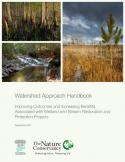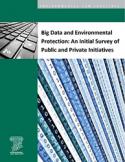
Research Reports
ELI publishes Research Reports available for free download that present the analysis and conclusions of the policy studies ELI undertakes to improve environmental law and policy. These reports contribute to education of the profession and disseminate diverse points of view and opinions to stimulate a robust and creative exchange of ideas. Those publications, which express opinions of the authors and not necessarily those of the Institute, its Board of Directors, or funding organizations, exemplify ELI’s commitment to dialogue with all sectors.
Watershed Approach Handbook: Improving Outcomes and Increasing Benefits Associated with Wetland and Stream Restoration Projects advances the use of a watershed approach in the selection, design and siting of wetland and stream restoration and protection projects, including projects required by compensatory mitigation.
Read More >Over the past several weeks, multiple documents related to RESTORE Act have been released by the Treasury Department,
which is tasked with administering the Restoration Trust Fund and overseeing Pots 1 and 5, and the Gulf Coast Ecosystem
Restoration Council, which oversees Pots 2 and 3. The documents are relevant to the administration, distribution of funds,
and proposal of projects and programs under the RESTORE Act. This chart lists them and their associated public
participation opportunities.

Big data sets and analytics increasingly are being used by government agencies, non-governmental organizations, and private firms to forward environmental protection. Improving energy efficiency, promoting environmental justice, tracking climate change, and monitoring water quality are just a few of the objectives being furthered by the use of big data. This paper provides examples of the many ways big data sets and analytics are being used to achieve environmental and sustainability goals.
Read More >
Shale gas development has raised concerns that local governments might be entering a “boom and bust” cycle. This study examines the gas boom in Pennsylvania’s Marcellus Shale, and explores best practices to forestall or mitigate a subsequent economic downturn or “bust.” A key focus of the study is the distribution and expenditure of state impact fees assessed on the gas industry.
Read More >Shale gas development has raised concerns that local governments might be entering a “boom and bust” cycle. ELI and the W&J Center have produced this practical guidebook for communities in southwestern Pennsylvania’s Marcellus Shale region to inform local officials and community organizations of some of their options to assure their communities receive long-term benefits from the development.
Read More >